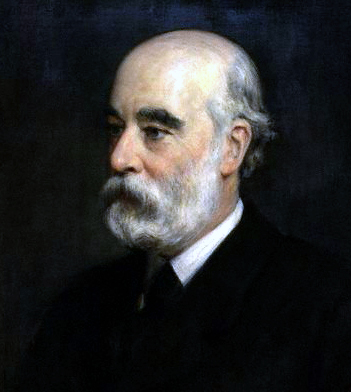1899
Recollections of George
Murray Smith
|
 |
|
George Murray Smith (1824-1901) was a publisher well known to Wilkie Collins.
He took over his father firm Smith, Elder in 1846 and published After
Dark in 1856. In 1861 he won
the bidding war for Wilkie's next novel but one which became Armadale,
published in his new Journal The Cornhill Magazine and in two
volumes in 1866. In the 1870s he re-published one volume editions
of several of Wilkie's books.
These reminiscences of Smith were taken down
by the Australian writer William Henry Fitchett (1841-1928) on a visit to
England in 1899. They have never been published but a typescript is in the National Library of Scotland.
The material was relied on by Leonard Huxley for his book The House of Smith
Elder published in 1923 which re-tells some
of these reminiscences of Wilkie Collins. |
My introduction to Wilkie Collins
came through Mr. Ruskin in the year [
]. Ruskin, I think, must have known Wilkie Collins’ father, the famous artist.
He brought me one day the MS. of a novel with a classical subject Wilkie Collins
had written. It was entitled “Antonina”, and wished to know whether I would
publish it. A “classical” subject, however was not tempting, and I declined the
proposal. Later on, as I have told elsewhere, Wilkie Collins offered me the tale
which afterwards attained great fame “The Woman in White”, and I had reason to
regret that I did not become its publisher. I published all his later books, and
a story of his “Armadale” appeared in ‘the Cornhill’, for which I paid him
£[5000]. Wilkie Collins’
books were selling very fairly, but their writer believed he might secure a much
larger constituency of readers. The books, he was persuaded, would have an
enormous sale if published at a very cheap price. Wilkie Collins, in a word,
almost—though not quite—anticipated the modern sixpenny editions. He wished to
publish his books not exactly at that low rate, but for 1s.0d or 2s.0d.—I forget
which. I did not share Wilkie Collins’s views on the subject, and said I would
not have any part in an enterprise which, I believed, would land him in a
disappointment. His books were, accordingly, transferred to Messrs. Chatto &
Windus, and the experiment of cheap editions was tried. Whether the result quite
satisfied Wilkie Collins himself I do not know, but it is possible that my
judgment as to the policy of low-priced editions was wrong.
Wilkie Collins presented a
peculiar appearance. He was a little man with a strangely-shaped head. Above
each brow was a great bulging protuberance, and one always felt curious to know
what might have been a phrenologist’s reading of a head so strangely-formed.
Wilkie Collins had fine social gifts and shone especially at mean’s parties; he
often cam to my wife’s “Fridays” at Hampstead. He was of a genial spirit, and,
though almost a constant sufferer from gout, rheumatism, and other ailments
showed a serene patience which was altogether admirable. His brother Charles
Collins, who married a daughter of Dickens, had much of the family charm, linked
to a very beautiful modesty. I had some small publishing transactions with him.
My life was crowded with so many,
and such divers, interests, that not seldom in publishing matters I had to
decide things in what may be called a happy-go-lucky manner; and sometimes this
cost me dearly.
Wilkie Collins, with whom I had a
pleasant acquaintance wrote to me in [January 1860] asking if I would make a
proposal for the “Woman in White”—probably the most popular novel of the last
hundred years. It had already appeared in
a serial form in [All the Year Round]. I asked three or four of my clerks if
they had read the tale, but none of them knew anything about it. Wilkie Collins
had asked for an early decision; I had to go out to dinner that night, and I
dictated a hasty note, making him an offer of £250 or £500 —I forget which—and
told my clerk to send the letter off.
The lady sitting beside me at
dinner that night was a bright and lively talker, and she somewhat startled me
by asking, “Have you read that wonderful book ‘The Woman in White’?” I said,
“No, have you?” “Oh, yes!” she said, “everybody is raving about it. We talk
‘Woman in White’ from morning till night!” If I had heard that piece of gossip a
couple of hours earlier, it would have multiplied my offer to Wilkie Collins
fivefold.
I
went to town earlier than usual next morning, and asked directly I reached my
office, “Have you sent that letter to Mr. Wilkie Collins?” “Yes,” was the reply:
“you said you wanted it sent quickly and it was delivered by hand.” If my offer
had been multiplied tenfold I should have made a large sum by the transaction;
but my hasty original offer cost me the pleasure and profit of publishing “The
Woman in White.” (pp6-9).
George Murray Smith, taken down by William Henry Fitchett 1899. From the
typescript in The National Library of Scotland. Some blanks left in the
typescript have been filled in where the facts are known.
go back to biographies list
go back to Wilkie Collins front page
visit the Paul Lewis front page
All material on these pages is © Paul Lewis 1997-2010
